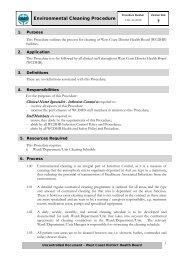Connections pamphlet - West Coast District Health Board
Connections pamphlet - West Coast District Health Board
Connections pamphlet - West Coast District Health Board
Create successful ePaper yourself
Turn your PDF publications into a flip-book with our unique Google optimized e-Paper software.
How do I sign up<br />
Contact:<br />
Sonja Worthington<br />
Child and Adult Resource Worker<br />
Child and Adolescent Mental <strong>Health</strong> Service<br />
PO Box 387<br />
Greymouth<br />
Phone Sonja : 03 768 2670 ext 2604<br />
Fax: Sonja 03 768 2675<br />
Email:<br />
sonja.worthington@westcoastdhb.org.nz<br />
If you want to come, or you would like<br />
your son or daughter to come but might<br />
need help to get here, please call me.<br />
Child & Adult Resource Worker<br />
Education and support for young people who are<br />
affected by their brother or sister’s<br />
mental health concern.<br />
Education and support for young people who have<br />
a parent with a mental health problem.<br />
Information and resources for community<br />
agencies about mental illness and its effect<br />
on young people.<br />
Support, educate and co-develop individual<br />
strategies for coping with the effects of<br />
living with mental illness.<br />
Support and advocacy role for the young people I<br />
work with, when dealing with mental health<br />
service providers or community agencies.<br />
Support for parents with mental health issues in<br />
their role of a parent.<br />
<strong>Connections</strong><br />
Child and Adult Resource Worker<br />
Child and Adolescent Mental <strong>Health</strong> Service<br />
PO Box 387<br />
Greymouth<br />
Phone: 03 768 2670 : Fax: 03 768 2675<br />
Email: sonja.worthington@westcoastdhb.org
Who is it for<br />
Who is it fo r:<br />
What’s the programme<br />
Week 1<br />
Introductions — Who is Here<br />
Things to know…<br />
if some one in your family has a mental illness<br />
Young people who have a parent with<br />
mental health problems such as<br />
depression, schizophrenia, bi polar<br />
disorder.<br />
What is it for<br />
Age range between 10-14/15<br />
Meeting other people of a similar<br />
age living in a similar situation in a<br />
confidential and safe way. You are<br />
not alone.<br />
Learning about mental illness and<br />
some strategies for coping with it<br />
when some one you live with has it<br />
Having fun<br />
When and where<br />
Greymouth CAMHS, Cnr Cowper<br />
St & Morice St Greymouth<br />
August 6th<br />
Week 2<br />
August<br />
13th<br />
Week 3<br />
August<br />
20th<br />
Purpose for the Meeting<br />
What does support mean for you<br />
What is Mental Illness anyway<br />
What questions do you have for the next few<br />
weeks<br />
How can I cope with this : Tips to help you get by<br />
Identifying feelings and what to do about them<br />
Stress Management<br />
Personal Strengths<br />
Forging a resilient path<br />
Communication<br />
Setting Goals<br />
Managing changes<br />
Solving problems<br />
It’s not your fault — You can’t cause some one’s<br />
mental illness. Mental Illness affects the way people<br />
think, their feelings and emotions and the way they<br />
deal with other people. There are things you can do to<br />
make it a little easier to live with.<br />
Take care of yourself – do things you like doing—<br />
sports, hobbies, crafts. Living with someone who has a<br />
mental illness can be very stressful. Make sure you<br />
take the time to do things you enjoy doing.<br />
Your feelings are OK—It is Okay to feel sad, angry,<br />
alone, confused, scared. Other people feel that way<br />
too. Talk to someone you trust— It’s is Ok to talk about<br />
how you feel with someone you trust—family member,<br />
teacher, school counsellor, mental health worker, child<br />
& adult resource worker.<br />
It can get better.— often with medication and with<br />
support from mental health services, people with a<br />
mental illness can get better and live a normal life.<br />
(Big, grey square building near<br />
the hospital bridge)<br />
How much does it cost<br />
Nothing but your time for a few weeks.<br />
Week 4<br />
August<br />
27th<br />
What else do I need to know<br />
Resources, systems information—who is that<br />
anyway and who else can help me.<br />
Finale—what else do I need, who can I stay in<br />
contact with.<br />
It’s no joke. It isn’t something people ask to have or<br />
like to have. People with mental illness are not<br />
psycho, schizo, lunies, crazies or nutters. It is<br />
important to find out as much as you can about<br />
mental illness through your library, mental health<br />
service or the internet. If you have questions, ask the<br />
mental health professionals.


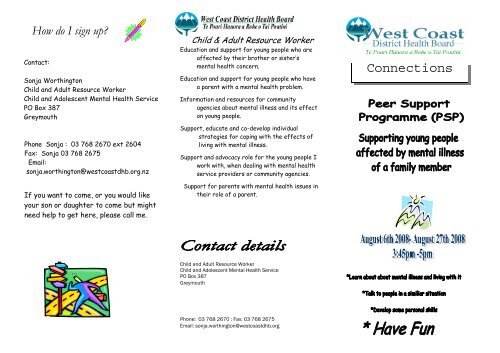

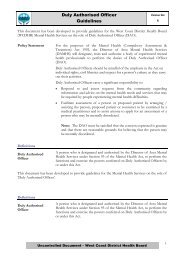
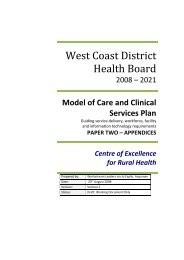
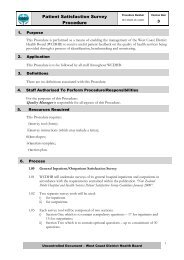
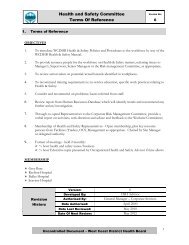
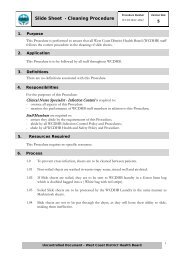

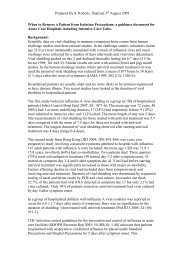
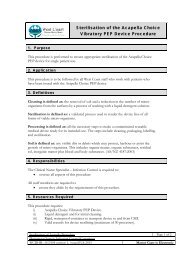
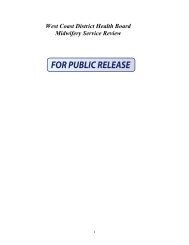
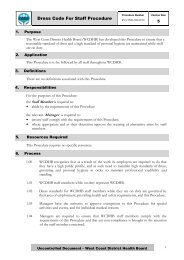

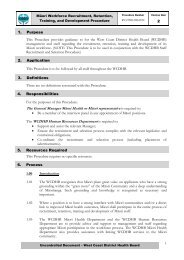
![Precept Procedure [PDF, 81 KB] - West Coast District Health Board](https://img.yumpu.com/42915337/1/184x260/precept-procedure-pdf-81-kb-west-coast-district-health-board.jpg?quality=85)
